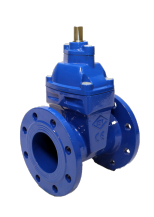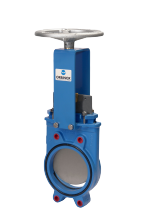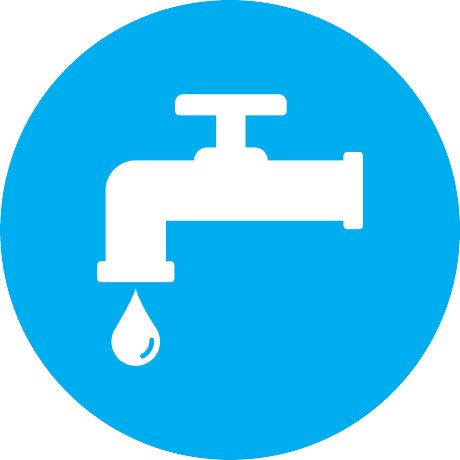Gate valves are essential components used primarily for on/off control, making them perfect for applications requiring complete flow cessation or unimpeded passage. Their design enables swift operation for rapid flow regulation, though they aren't ideal for precise throttling. Featuring components like the gate, stem, seat, and bonnet, gate valves offer robust sealing and protection, ensuring reliable performance across various industries. They can be manually operated via a handwheel or automated with an actuator, providing versatility in flow control mechanisms.



Gate Valves
2 series from 2 manufacturers
The Operating Principles of a Gate Valve
The operating principle of a gate valve revolves around its fundamental mechanism: controlling fluid flow by manipulating a gate within the valve body. Gate valves come in various designs, including rising stem, non-rising stem, and split wedge configurations. This gate, linked to a stem, serves as the pivotal element, orchestrating the obstruction or allowance of fluid passage as it ascends or descends. Whether through manual operation, utilizing a handwheel for tactile control, or automated means employing an actuator to respond to external commands, the gate's movement dictates the flow state. Crucially, when the gate seals against the seat located at the valve's base, fluid leakage is prevented, ensuring a secure closure.
Housed within the valve body, these components work harmoniously, while the bonnet provides essential protection. Renowned for their reliability and versatility, gate valves find widespread application across various industries, offering precise on/off control where fluid regulation is paramount.

Advantages & Disadvantages of Gate Valves
Gate valves have various attributes that make them valuable in fluid control systems. Understanding both their advantages and disadvantages is crucial for informed decision-making.
Advantages
Gate valves offer several benefits that make them suitable for various applications. Here are some key advantages:
- Full Flow: Gate valves provide minimal obstruction to fluid flow when fully open, allowing for maximum flow capacity.
- Tight Shut-Off: When closed, gate valves offer a tight seal against fluid leakage, ensuring efficient shut-off.
- Versatility: Gate valves can handle a wide range of temperatures and pressures, making them suitable for diverse industries.
- Reliability: Known for their durability and long service life, gate valves provide reliable performance in critical applications.
- On/Off Control: Gate valves excel at precise on/off control, making them ideal for scenarios requiring immediate flow adjustment.
Disadvantages
Despite their advantages, gate valves also have some limitations that should be considered:
- Slow Operation: Gate valves typically have slower operation compared to other valve types, which can affect overall system response time.
- Not Suitable for Throttling: Gate valves are not designed for precise flow regulation, and attempting to throttle the flow may cause excessive wear and damage.
- Sensitivity to Debris: Gate valves can be sensitive to debris in the fluid, leading to potential issues such as gate sticking or improper sealing.
- Size and Weight: Gate valves tend to be relatively large and heavy, which may limit their suitability for certain applications with space or weight constraints.
Important Consideration when Selecting Gate Valves
When selecting gate valves for your application, several key considerations should be taken into account to ensure optimal performance and compatibility. These considerations include:
- Application Requirements: Understanding the specific requirements of your application is crucial for selecting the right gate valve. Consider factors such as the type of fluid being handled (e.g., water, oil, gas), the temperature and pressure conditions within the system, the flow rate required, and any unique system specifications. For example, different fluids may require different materials of construction, and high-pressure applications may necessitate valves with higher pressure ratings.
- Material Compatibility: The materials of construction for the gate valve must be compatible with the fluid being handled and the operating conditions. For example, corrosive fluids may require gate valves made from corrosion-resistant materials such as stainless steel or special alloys. Similarly, high-temperature applications may require materials that can withstand elevated temperatures without degrading.
- Pressure Rating: The pressure rating of the gate valve should match or exceed the maximum pressure expected in the system. Gate valves are typically available with various pressure ratings, so it's essential to select one that can safely handle the maximum operating pressure without risk of failure or leakage.
- End Connection: Gate valves come with different end connections, such as flanged, threaded, or welded connections. The choice of end connection depends on the piping system's configuration and requirements. Ensure that the gate valve's end connection is compatible with the existing piping system to facilitate proper installation and ensure a secure connection.
Why Buy Gate Valves from AxFlow
At AxFlow, we understand how important gate valves are for controlling fluid flow in different industries. Our team is made up of experienced professionals who know a lot about fluid handling systems. We're here to provide you with personalized solutions that fit your specific needs. With access to a wide range of gate valves from top manufacturers around the world, we make sure you get the latest technology and high-quality products. Whether you need help choosing the right valve, installing it, or keeping it running smoothly, our experts are here to help you every step of the way. You can trust AxFlow for reliable performance and expert advice on gate valve solutions.




